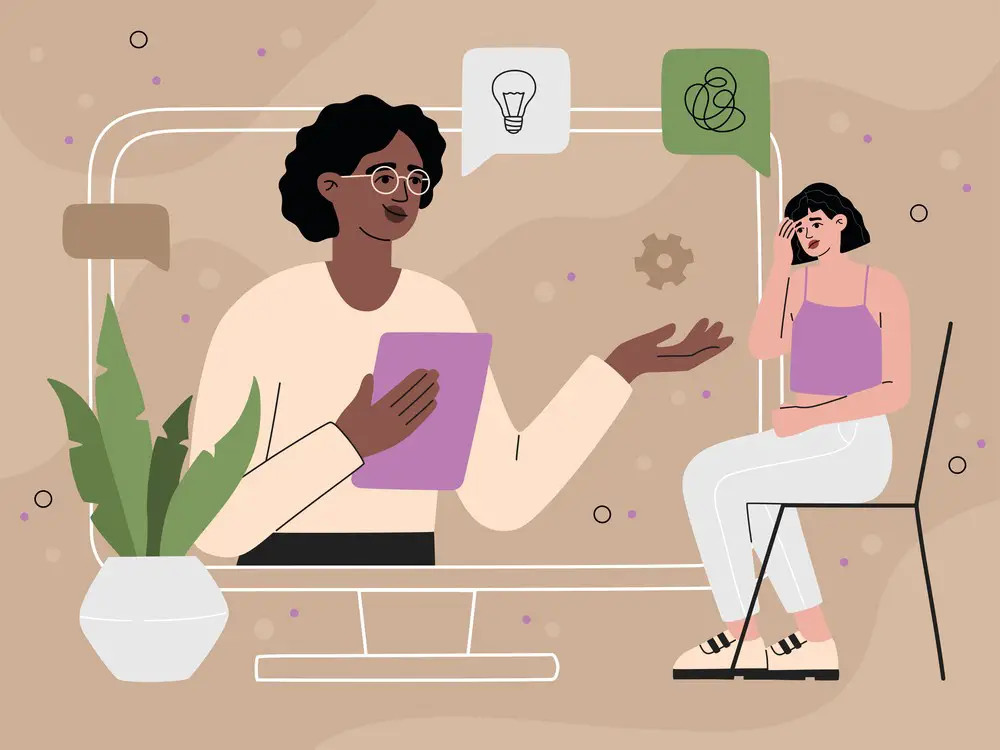As a BetterHelp affiliate, we receive compensation from BetterHelp if you purchase products or services through the links provided
Therapy is so expensive – it’s a phrase that often frustrates us. While therapy is not always the most affordable option, there are ways to ensure you get your money’s worth when seeking professional help. This blog post will explore why therapy can be expensive, how long sessions typically last, what online therapy options exist as an alternative to traditional face-to-face visits, and other alternatives for those who cannot afford traditional therapies. We’ll also discuss resources available for mental health support outside formal counseling so everyone can access the tools they need during difficult times. Let’s start by looking at what exactly makes up the cost of “therapy so expensive”?
Table of Contents:
What is Therapy?
Therapy is a form of mental health treatment that involves talking with a trained professional to help identify and manage stress, anxiety, or insomnia. It can treat many conditions, including depression, phobias, post-traumatic stress disorder (PTSD), relationship issues, substance abuse problems, and more. Therapy can also be used as an adjunct to medication for those struggling with mental health issues.
Therapy aims to provide support and guidance while helping individuals gain insight into their thoughts and behaviors to make positive life changes. Through therapy sessions, people learn how to better cope with difficult emotions and situations by developing healthier coping strategies.
During therapy sessions, clients will work with their therapist to set goals for themselves based on what they want out of life; these goals may include improving communication skills or learning how to better manage stressors in daily life. The therapist will then guide the client through various techniques, such as cognitive behavioral therapy (CBT) or mindfulness-based approaches, which focus on changing negative thought patterns into more positive ones that improve overall well-being.
Therapy can also involve exploring past experiences that may have contributed to current feelings of distress or anxiety so that new perspectives can be gained about them; this helps individuals develop self-awareness which allows them greater control over their emotions and reactions when faced with challenging situations the future. Additionally, therapists often provide psychoeducation about common symptoms associated with specific disorders so that clients understand why they feel a certain way and what steps they need to take to move forward positively.
Overall, therapy provides an opportunity for individuals suffering from anxiety or insomnia—or any other mental health issue—to explore the underlying causes behind their struggles while gaining practical tools needed for managing symptoms long-term without relying solely on medications alone. In addition, it offers a safe space where people feel heard without judgment while providing compassionate care explicitly tailored towards meeting individual needs, no matter what stage someone is at in their recovery journey.
Therapy can be an invaluable tool for managing anxiety and insomnia, but it is essential to understand the cost of therapy before committing to a plan. Next, we’ll explore the different costs associated with therapy.
Cost of Therapy
The cost of therapy can vary greatly depending on the type of therapy, where you live, and whether or not your insurance covers it. Generally speaking, individual psychotherapy sessions range from $50 to $250 per hour. Group therapy is usually less expensive than individual sessions and may cost anywhere from $20 to $100 per session.
Cognitive Behavioral Therapy (CBT) is a popular form of talk therapy that focuses on changing unhealthy thought patterns to improve moods and behaviors. Unfortunately, the average cost for CBT ranges from about $60-$200+ per session without insurance coverage. With insurance coverage, however, the prices could be much lower or even free, depending on your plan’s details.
Psychodynamic Therapy is another common form of talk therapy that explores how unconscious thoughts and feelings influence behavior to gain insight into why people act in specific ways in different situations. This type of therapy typically runs between $75-$150 an hour with no insurance coverage but could be cheaper if covered by your health plan.
Family Therapy involves multiple family members meeting with a therapist who helps them communicate better and resolve conflicts more effectively as a unit. Depending on the number of participants involved in each session, this type of counseling can range from around $90-$200 an hour without any insurance discount applied towards it; however, some plans do cover family counseling, so it is essential to check with yours first before making any commitments financially.
Dialectical Behavior Therapy (DBT) combines cognitive behavioral techniques with mindfulness practices that help individuals better regulate their emotions while improving interpersonal relationships at home or work. This type tends to run anywhere between $80-$180 or more per hour without any health care discount, though there are cases where DBT might be covered under specific plans, so make sure you double-check before signing up for anything.
Although therapy can be expensive, many resources are available to help make it more affordable. In the next section, we will discuss the length of therapy and how that impacts cost.
Length of Therapy
Therapy is a process of self-exploration and growth, so the length of therapy varies from person to person. Generally speaking, most people attend therapy for at least six months, but some may need more or less time depending on their individual needs. It’s important to note that there is no set timeline for how long therapy should last; it’s up to you and your therapist to decide what works best for you.
The frequency of sessions also depends on each individual’s needs. Most therapists recommend weekly sessions to get the most out of treatment, but this can vary depending on the type of therapy used and other factors such as cost or availability. Some therapists may suggest meeting every two weeks or even monthly if needed.
It’s important to remember that progress takes time and patience; don’t expect overnight results! Instead, your therapist will work with you over an extended period to help you reach your goals and make lasting changes. If, after several months (or longer), you feel like progress has stalled or isn’t happening fast enough, talk with your therapist about changing strategies or exploring different approaches that might be better suited for your particular situation.
Therapy can be a great way to help manage stress and anxiety, but it’s essential to consider the length of therapy when making treatment decisions. So first, let’s look at online therapy as an option for those who may not have access to traditional in-person therapy.
Online Therapy
Online therapy is an increasingly popular option for those seeking mental health support. It offers many advantages over traditional in-person therapy, including lower costs and more flexible scheduling options.
One of the most significant benefits of online therapy is that it can be accessed from anywhere with an internet connection. This means you don’t have to worry about finding time to travel to and from your therapist’s office or making sure you are available during their business hours. You can access your sessions anytime, day or night, making it easier to fit into busy schedules and lifestyles.
Another advantage of online therapy is that it tends to be less expensive than traditional in-person counseling services. Online therapists often charge lower rates due to not having overhead costs associated with running a physical practice, such as rent and utilities. Additionally, many insurance companies now cover teletherapy services so that you may get reimbursed for some or all of the cost depending on your plan coverage.
In addition, more types of therapies are available through online platforms than what might typically be offered by local providers in person. For example, I live in a rural area where there aren’t many counselors nearby who specialize in specific treatments like cognitive behavioral therapy (CBT). Accessing these services virtually could provide much-needed relief without driving long distances or waiting weeks for an appointment slot at a distant clinic location.
Finally, because most virtual sessions take place via video chat programs like Skype or Zoom rather than face-to-face meetings, they offer greater privacy and anonymity compared with traditional methods since no one else needs to know about them unless you choose otherwise – something that can be especially beneficial if talking openly about personal issues makes someone feel uncomfortable or embarrassed when done around other people they know personally outside the therapeutic setting.
Overall, online therapy provides numerous benefits over traditional methods, such as convenience, affordability, variety, and confidentiality. If you’re looking for help managing stressors related to anxiety or insomnia but don’t have access locally, consider exploring virtual counseling options as an alternative way forward.
Online therapy is becoming increasingly popular for those seeking mental health support. With online therapy, individuals can access professional help from the comfort of their own homes or any other location with internet access. In addition, this therapy offers many advantages over traditional in-person counseling sessions, including lower costs and more flexible scheduling options.
Costs: One significant benefit to online therapy is that it tends to be much less expensive than traditional face-to-face counseling sessions. Many therapists offer discounted rates for virtual appointments due to the lack of overhead associated with providing services remotely. Additionally, some insurance plans may cover all or part of the cost of online counseling sessions, depending on your provider and plan details.
Flexibility: Another advantage of online therapy is its flexibility in scheduling appointments. You don’t have to worry about finding time in your busy schedule or commuting long distances to get the help you need; instead, you can connect with your therapist at any time that works best for you – even if it’s late at night or early in the morning! Plus, many therapists offer video conferencing options so you can still feel connected even though you aren’t meeting in person.
Online therapy also provides added privacy and safety benefits compared to traditional counseling services since there are no physical meetings involved; this means fewer potential risks, such as running into someone who knows you while attending a session or having confidential information overheard by others nearby during an appointment. Furthermore, most reputable providers use secure platforms like Zoom, which encrypt data transmissions between clients and counselors so that conversations remain private and protected from hackers and other cyber threats.
Overall, online therapy offers numerous advantages over traditional face-to-face counseling sessions – particularly when it comes to cost savings and convenience. This makes it an ideal option for those seeking mental health support without sacrificing their privacy or safety concerns. With lower costs, more flexible scheduling options added privacy benefits, and secure data transmission platforms available, there are many reasons why individuals should consider giving online therapy a try.
Online therapy can be a great way to get the help you need without breaking the bank, but other alternatives are available if it’s not an option for you. Let’s explore some of those options in the next section.
Alternatives to Therapy
When it comes to stress relief, therapy is not the only option. Many alternatives can be just as effective in helping you manage your anxiety or insomnia.
Meditation: Meditation is a great way to relax and reduce stress levels. It involves focusing on your breath and clearing your mind of any worries or negative thoughts. You can do this for as little as five minutes daily, either sitting silently or with guided meditation audio recordings available online.
Exercise: Exercise releases endorphins which help improve mood and reduce stress levels. It doesn’t have to be too strenuous; even walking around the block can make a difference! Regular exercise also helps promote better sleep quality, reducing feelings of anxiety and depression.
Journaling: Writing down our thoughts has been shown to help us process them more effectively, reducing feelings of overwhelm and distress associated with anxiety disorders or insomnia. In addition, taking time each day to write down how you’re feeling can clarify what triggers certain emotions, allowing you to take steps towards managing them better over time.
Yoga combines physical activity with mindfulness techniques such as breathing exercises and meditation, making it ideal for physical benefits like improved flexibility and mental health benefits like reduced stress levels. For example, stretching poses combined with deep breathing exercises can be calming activities that help to reduce stress levels.
Nature Walks: Being outdoors surrounded by nature has been proven beneficial in reducing symptoms of anxiety or insomnia due to its calming effects on the body & mind – fresh air does wonders! In addition, going out into nature allows us to appreciate the beauty around us while getting some much-needed exercise simultaneously – a double win!
Although therapy can be expensive, plenty of alternatives are available to help you manage your mental health needs. The following section will explore some mental health resources that may provide additional support.
Mental Health Resources
Mental health resources are available to help people who struggle with anxiety, depression, or other mental health issues. These resources can provide support and guidance for those in need of assistance.
Support Groups: Support groups are a great way to connect with others with similar experiences and struggles. They provide an opportunity to share stories, learn from each other’s successes and failures, and gain emotional support. Many communities offer free or low-cost support groups that meet regularly at churches, community centers, hospitals, libraries, or online.
Hotlines: Hotlines provide confidential access to trained professionals who can answer questions about mental health issues and refer callers to local services such as counseling centers or crisis hotlines. Most hotlines operate 24 hours a day and are staffed by volunteers or paid counselors who specialize in providing information on mental health topics like stress management techniques and coping strategies for dealing with difficult emotions.
The internet is filled with websites dedicated to helping people manage their mental health challenges through self-help tools such as guided meditations, relaxation exercises, educational articles about various disorders and conditions related to anxiety/depression/insomnia, etc., forums where individuals can discuss their experiences, anonymously with others going through the same thing; virtual therapy sessions; audio recordings of calming music; mindfulness activities; lifestyle tips for managing stress levels.
Therapy services are another vital resource for those seeking professional help for their mental health needs. Therapists use evidence-based approaches such as cognitive behavioral therapy (CBT), which helps clients identify unhealthy thought patterns contributing to their distress, so they can develop healthier ways of thinking that lead them toward positive outcomes in life situations. Other forms of therapy include psychodynamic therapy, which focuses on exploring past events that may be influencing current behavior patterns; interpersonal therapy, which focuses on improving communication skills between family members/friends/partners; dialectical behavior therapy (DBT), which teaches emotion regulation skills among other things; art and play therapies explicitly designed for children and adolescents struggling with emotional difficulties etc.
Mental health resources are available to those who need help managing their mental health. Support groups provide a safe space for individuals to talk about their experiences and find support from others with similar struggles. In addition, hotlines offer anonymous, confidential advice and guidance on various topics related to mental health.
Support Groups: Support groups can be found in many communities and online. They allow people to connect with others with similar issues or concerns, such as anxiety or depression. These groups often include activities that will enable members to practice coping skills, share stories of recovery, and learn new strategies for managing stressors in life.
Hotlines: Hotlines are available 24/7 and provide free information on various topics related to mental health, including crisis intervention services, suicide prevention services, substance abuse counseling, domestic violence assistance programs, legal aid referrals, and more. Most hotlines also offer emotional support during difficult times by providing someone you can talk to without judgment or fear of repercussions.
Therapy Services: Therapy is another excellent resource for those struggling with mental illness or distressful situations in life. Professional therapists specialize in helping people identify the root causes of their problems so they can develop healthier ways of thinking and behaving that will lead them toward better outcomes in the future. Therapists may use cognitive-behavioral therapy (CBT), dialectical behavior therapy (DBT), psychodynamic therapy (PDT), or other evidence-based approaches depending on individual needs and preferences.
Access to mental health resources is an essential step in taking control of your mental well-being. The next step is finding a therapist that fits your needs and budget.
Finding a Therapist
Finding a therapist can be an intimidating process. It’s essential to take the time to research and find someone who is right for you. Here are some tips on how to do that:
Research Therapists: Start by researching therapists in your area. Look at their credentials, such as their education, experience, and areas of expertise. You may also want to read reviews from other clients or ask friends for recommendations.
Ask Questions During Consultation: Once you’ve narrowed your list of potential therapists, contact them for an initial consultation (usually free). Ask questions about their therapy approach and ensure they have experience treating issues similar to yours. Make sure you feel comfortable with the therapist before committing to treatment.
Check Insurance Coverage: If you plan on using insurance coverage for therapy sessions, check with your provider beforehand to know which therapists are covered under your plan. This will help narrow down your search even further.
After finding a therapist that seems like a good fit, schedule follow-up appointments so that you can continue getting treatment over time if needed or desired. Keep track of any progress made during each session and discuss it with the therapist regularly so adjustments can be made to maximize results from therapy sessions in the future.
FAQs
Why is getting therapy so expensive?
Generally speaking, therapy is expensive because it requires specialized knowledge and expertise from a trained professional. Additionally, therapists must pay for overhead costs such as office space rental or administrative staff to keep their practice running. As a result, these costs are passed onto clients through higher fees for services rendered.
Is it worth paying for therapy?
The decision to pay for therapy is personal and should be based on individual needs. It can be beneficial in helping to reduce symptoms of anxiety or insomnia, as well as providing emotional support and guidance. However, it is essential to research the therapist’s credentials and experience before committing financially. Also, free resources, such as online counseling services or self-help books, may provide relief without any associated cost. Whether or not to pay for therapy depends on each person’s unique situation and preferences.
Why is therapy not covered by insurance?
Insurance does not typically cover therapy because it is considered an elective or non-essential service. Insurance companies often only cover medically necessary services, such as treatments for physical illnesses and injuries. Mental health services, including therapy, may be excluded from coverage due to the subjective nature of mental health issues and the difficulty in determining whether a particular treatment has been effective. Additionally, many insurance plans have limited coverage for mental health services or require high co-pays and deductibles before any benefits can be accessed.
How can I make therapy more affordable?
There are a few ways to make therapy more affordable. One option is to look for sliding scale fees, which allow you to pay what you can afford based on your income. Additionally, some therapists offer reduced rates for those who cannot afford it. You may also be able to find free or low-cost counseling services through community health centers, religious organizations, and universities. Lastly, many insurance plans cover mental health services, so it’s worth checking with your provider if they have any coverage options available that could help reduce the cost of therapy.
Conclusion
In conclusion, therapy can be expensive, but it doesn’t have to be. With the right resources and knowledge, you can find affordable options that fit your needs. Whether you choose online therapy messaging only as an entry point or opt for traditional in-person sessions, there are plenty of ways to get the help you need without breaking the bank. Remember that mental health is just as important as physical health, and don’t let costs stand in the way of getting professional help if needed. Don’t forget that there are also alternatives to therapy, such as self-help books and support groups, which may provide some relief from stressors or anxiety even though they may not address underlying issues like therapy so expensive does.
Therapy is invaluable for managing stress and mental health but can be prohibitively expensive. We need to find solutions that make treatment more accessible to those who need it most. Rest Equation provides advice on managing stress without using costly professional help and information about different types of therapies available and potential payment options so that everyone can benefit from this vital service. Let’s work together towards a future where affordable therapy is within reach for all!
- 3 Ways Wearing a Hat Can Help Lower Your Stress Levels - April 19, 2025
- Breaking the Silence: Why Men’s Mental Health Matters More Than Ever - April 15, 2025
- How to Transform a Home’s Patio Space into a Relaxing Space - March 23, 2025
This site contains affiliate links to products. We will receive a commission for purchases made through these links.









